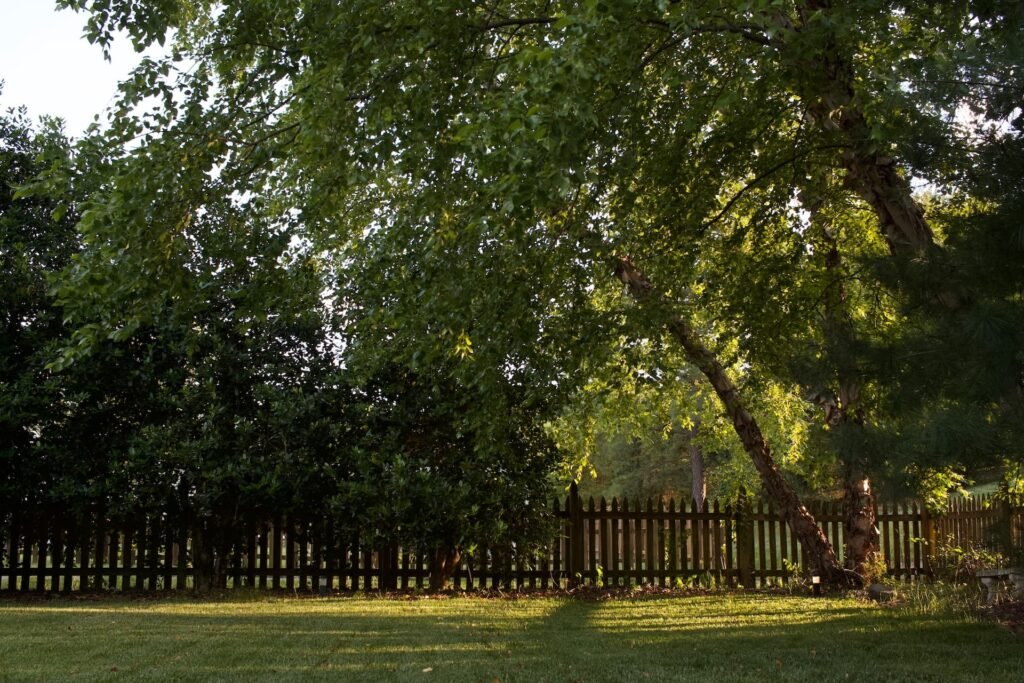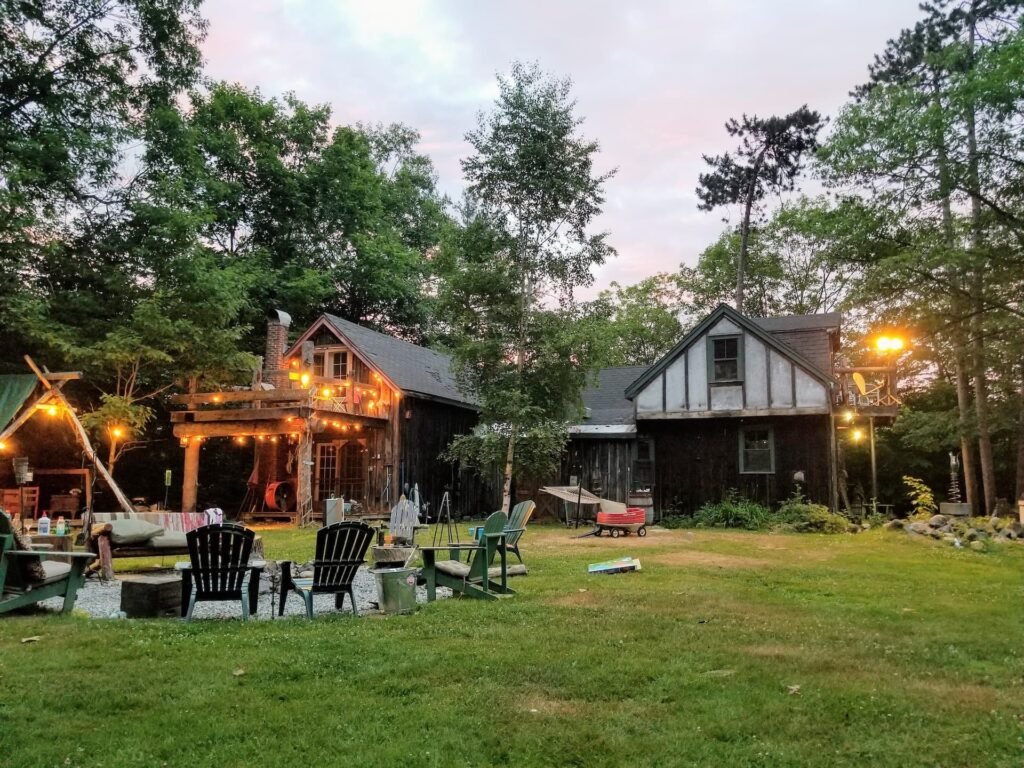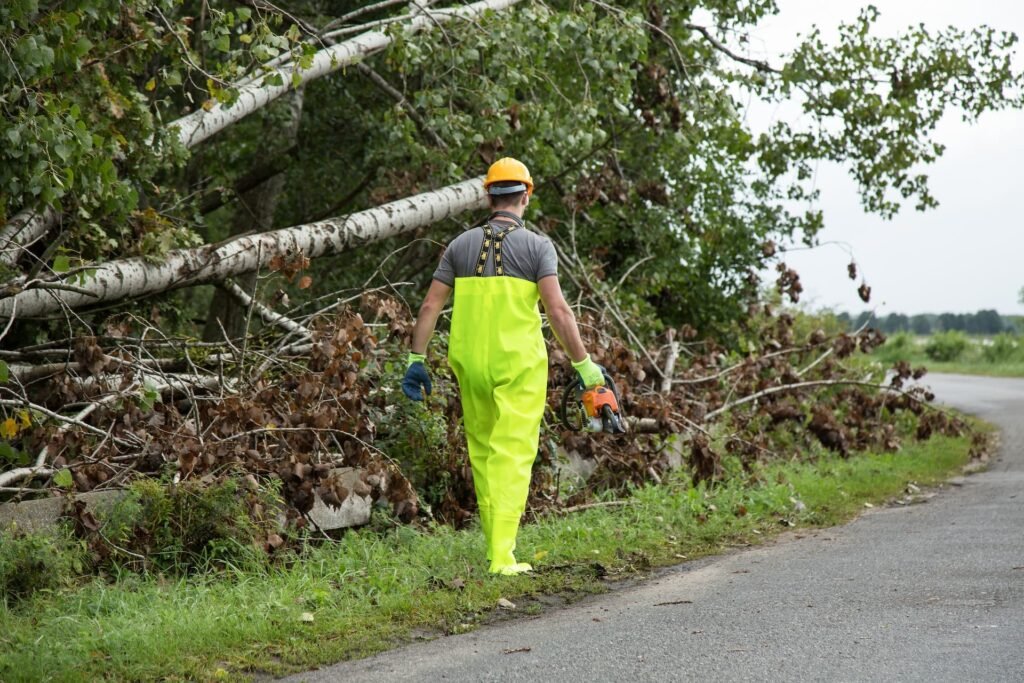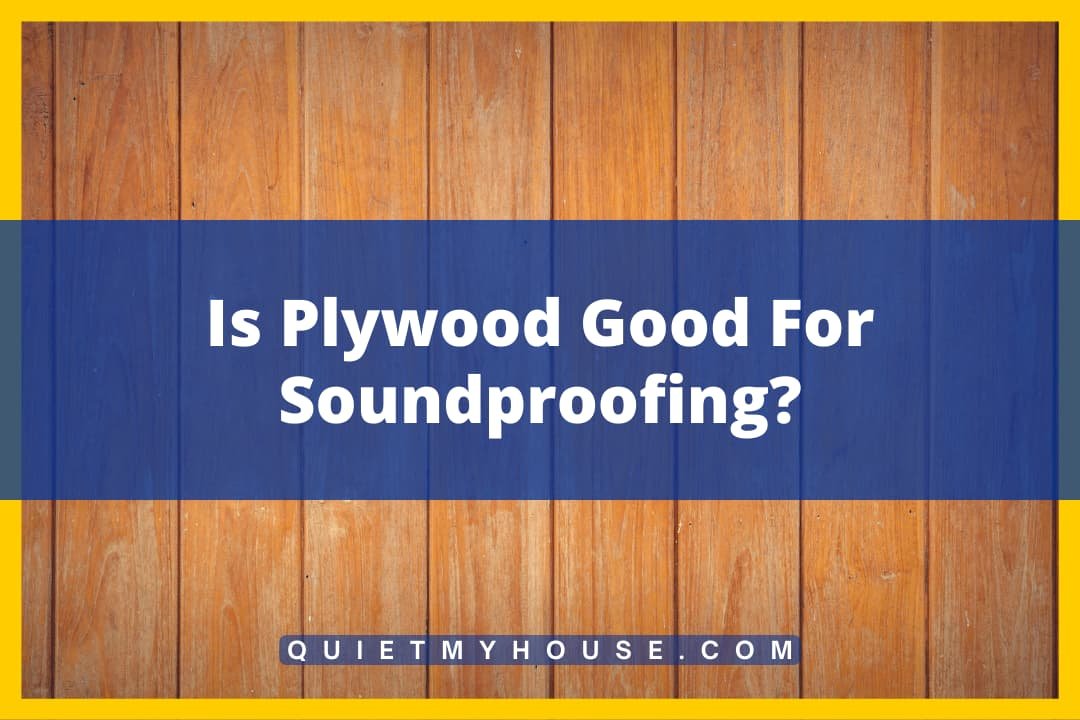Living near a busy highway can be quite noisy and disrupt the peace and tranquility of your backyard. The constant rumble of traffic can be overwhelming. However, there are ways you can minimize the impact of highway noise and create a more enjoyable outdoor space.
Whether you’re lounging by the pool or hosting a barbecue, implementing these effective strategies will help you reduce highway noise in your backyard and reclaim the serenity you deserve.
Choosing the Right Landscaping Methods
Creating a Noise Barrier using Natural Features
When it comes to reducing highway noise in your backyard, one effective method is to create a noise barrier using natural features.
This involves strategically placing natural elements such as trees, shrubs, and bushes between your backyard and the highway. The dense foliage will help absorb and deflect the soundwaves, significantly reducing the amount of noise that reaches your outdoor space.
By carefully selecting the types of plants that have large leaves or thick branches, you can maximize the effectiveness of this noise barrier.
Installing a Fence or Wall
Another popular option for reducing highway noise is to install a fence or wall. This physical barrier helps to block and absorb soundwaves, preventing them from reaching your backyard.
When choosing a fence or wall, it’s important to select materials that are specifically designed for noise reduction. Look for options such as concrete, stone, or wood composite, as these materials are more effective in blocking sound than traditional wood fences.
Additionally, consider the height and thickness of the barrier, as taller and thicker structures will provide better noise reduction.
Planting Trees and Shrubs
In addition to creating a noise barrier, planting trees and shrubs can also greatly contribute to reducing highway noise in your backyard.
Not only do they add beauty and greenery to your outdoor space, but they can also act as natural sound absorbers.
Trees with broad leaves and dense foliage are particularly effective in absorbing soundwaves. Planting a row of trees along the perimeter of your property, especially on the side facing the highway, can significantly reduce the noise level in your backyard.
Additionally, shrubs and bushes planted closer to your house can help further dampen the noise before it reaches your outdoor living areas.
Adding Water Features
Water features, such as fountains or ponds, are not only aesthetically pleasing but also serve as effective noise reducers.
The sound of flowing water helps to mask and drown out unwanted highway noise, creating a more peaceful and tranquil environment in your backyard.
Whether you opt for a small standalone fountain or a larger pond with cascading waterfalls, incorporating water features into your landscape design can make a noticeable difference in reducing highway noise.
Additionally, the visual appeal of water features adds a soothing and relaxing element to your outdoor space.
Weatherproofing Techniques for Soundproofing
Using Sound Absorbing Materials
In addition to landscaping methods, there are various weatherproofing techniques that can be employed to further soundproof your backyard from highway noise.
One of these techniques involves the use of sound-absorbing materials. These materials, such as acoustic panels or foam, are designed to absorb and reduce the transmission of soundwaves.
By strategically placing these materials on the walls or fences surrounding your backyard, you can create an additional layer of noise insulation. Not only will this help to prevent sound from entering your outdoor space, but it will also enhance the overall sound quality within your backyard.
Using White Noise Machines
White noise machines are another effective tool for reducing highway noise in your backyard. These machines emit a constant and soothing background noise that helps to mask and camouflage unwanted sounds, such as the noise from the nearby highway.
By strategically placing white noise machines around your outdoor living areas, you can create a more pleasant and peaceful atmosphere.
Additionally, white noise machines have adjustable settings, allowing you to customize the level of sound to suit your preferences and effectively mask the noise from the highway.
Installing Soundproof Windows
Soundproof windows are a more substantial investment but can provide significant noise reduction benefits. These windows are specifically designed to minimize sound transmission, effectively sealing off your indoor spaces from the outside noise.
By installing soundproof windows in areas adjacent to your backyard, such as the living room or bedroom, you can greatly reduce the amount of highway noise that infiltrates your home.
Furthermore, soundproof windows also offer additional insulation benefits, helping to maintain a comfortable indoor temperature and lower energy costs.
Creating a Physical Barrier
Building a Berm or Mound
One effective method of reducing highway noise is the construction of a berm or mound. A berm is an earthen barrier typically made by piling up soil or rocks, while a mound is a man-made hill that serves as a physical barrier.
Both options can be effective in deflecting and absorbing soundwaves, thereby minimizing the amount of highway noise that reaches your backyard.
When constructing a berm or mound, it is important to ensure that it is built with the right slope and height to provide optimal noise reduction. Additionally, you can further enhance the effectiveness of the barrier by planting trees or shrubs on top of the berm or mound.
Constructing a Noise Barrier Wall
A noise barrier wall is a more permanent and substantial solution for reducing highway noise in your backyard. These walls are specifically designed to block and reflect soundwaves away from your outdoor living areas.
When constructing a noise barrier wall, it is crucial to use materials that are dense and thick, such as concrete or stone.
The height and width of the wall will also play a significant role in its effectiveness, so it is important to consult with professionals or experts to help determine the optimal dimensions for your specific needs.
By building a noise barrier wall, you can create a quiet and peaceful oasis in your backyard despite the proximity to a busy highway.
Installing a Gabion Wall
A unique and visually appealing option for creating a physical barrier against highway noise is the installation of a gabion wall.
Gabions are wire mesh containers filled with stones or other natural materials, forming a sturdy and durable wall. Besides their aesthetic appeal, gabion walls offer excellent noise reduction properties.
The gaps between the stones and the wire mesh allow for sound absorption and deflection, effectively minimizing sound transmission.
Additionally, gabion walls have the advantage of being permeable, allowing air and natural light to pass through while still providing the desired noise reduction benefits.
Choosing the Right Materials
Using Absorptive Materials for Fences
When selecting materials for your fences, it is important to consider their sound-absorbing properties. Opting for materials that are known for their noise reduction capabilities, such as wood composite or concrete, can significantly contribute to reducing highway noise in your backyard.
These materials have the ability to absorb and dampen soundwaves, preventing them from traveling into your outdoor living areas.
Additionally, the thickness and density of the materials will also play a role in their effectiveness, so it is crucial to choose options that offer optimal noise reduction benefits.
Selecting Noise-Reducing Pavement for Driveways
If your backyard is adjacent to a highway, the noise from passing vehicles can still reach your outdoor space through the driveway.
One way to minimize this noise is by selecting noise-reducing pavement for your driveway. These specially designed pavements are made to absorb and deflect soundwaves, significantly reducing the amount of noise that enters your backyard.
Asphalt or rubberized pavement, for example, have noise-reducing properties that can make a noticeable difference. Additionally, maintaining proper drainage in your driveway can also help to further reduce noise, as water-filled potholes can act as amplifiers for sound.
Considering Noise Barrier Fencing Materials
Another important factor to consider when reducing highway noise in your backyard is the type of materials used for your fencing.
Certain materials, such as wood composite or concrete, offer superior noise barrier properties, effectively blocking and absorbing soundwaves.
These materials are denser and have better sound insulation capabilities compared to traditional wood fences. By carefully selecting noise barrier fencing materials, you can create a solid and effective barrier that prevents highway noise from entering your outdoor living spaces.

Modifying Your Landscape Design
Utilizing Natural Topography
Working with the existing natural topography of your backyard can be a cost-effective and efficient way to reduce highway noise.
Natural features such as hills, slopes, or valleys can act as natural barriers, helping to block and deflect soundwaves.
By strategically arranging seating areas, outdoor structures, or planting additional vegetation in these areas, you can further enhance the noise reduction capabilities of the natural topography.
Additionally, creating terraced gardens or elevated platforms can also help to elevate the distance between your backyard and the highway, providing an added noise reduction advantage.
Adding Dense Vegetation
In addition to utilizing natural topography, incorporating dense vegetation into your landscape design can significantly contribute to reducing highway noise.
Dense vegetation, such as hedges or thick shrubs, acts as a physical barrier and sound absorber. By strategically placing these plantings along the perimeter of your backyard or in areas closer to the highway, you can create an additional layer of noise insulation.
Additionally, consider planting trees with large leaves or thick branches, as these types of trees are more effective in absorbing soundwaves.
The combination of natural topography and dense vegetation can create a peaceful and quiet oasis in your backyard, shielding you from the noise of the nearby highway.
Creating an Outdoor Living Area away from the Noise Source
If your backyard is situated close to a highway, it may be beneficial to create an outdoor living area away from the noise source.
By strategically positioning your seating area, patio, or deck on the opposite side of your property, you can minimize the direct impact of highway noise.
Utilize your landscape design to maximize the distance between the noise source and your outdoor living area.
By creating a separate space for relaxation and entertainment away from the noise, you can still enjoy the tranquility of your backyard without being disturbed by the highway traffic.
Utilizing Soundproofing Techniques for Existing Structures
Insulating Walls and Ceilings
If your backyard is adjacent to a wall or the exterior of your house, it is important to consider soundproofing the existing structures. Insulating the walls and ceilings can significantly reduce the transmission of soundwaves into your indoor spaces.
There are various soundproofing materials available, such as acoustic insulation or soundproof drywall, that can be installed to enhance the soundproofing capabilities of your walls and ceilings.
Additionally, it is essential to ensure that there are no gaps or cracks along the edges of windows or doors, as these areas can be entry points for sound. By properly insulating your walls and ceilings, you can create a quieter and more peaceful environment indoors.
Sealing Windows and Doors
Windows and doors are often weak points for sound transmission, allowing highway noise to penetrate your indoor spaces. To minimize the sound infiltration, it is crucial to seal windows and doors properly.
Weatherstripping or caulk can be used to seal any gaps or cracks around the edges of windows and doors, preventing sound from entering your home.
Additionally, installing double-glazed windows or adding soundproofing window inserts can further enhance the noise reduction capabilities.
By properly sealing windows and doors, you can create a quieter and more comfortable indoor environment, even when the highway traffic is at its busiest.
Using Mass Loaded Vinyl
Mass loaded vinyl (MLV) is a versatile and effective soundproofing material that can be used to enhance the noise reduction properties of existing structures.
MLV is a specially designed vinyl sheet that is dense and heavy, making it an excellent sound blocker. It can be installed on walls, ceilings, or other surfaces to create an additional layer of sound insulation.
MLV is particularly useful in reducing low-frequency noises, which are often more difficult to absorb. By incorporating MLV into your soundproofing efforts, you can significantly reduce the impact of highway noise on your indoor spaces.

Using Noise-Canceling Devices
Using Noise-Canceling Headphones
If you are looking for a portable and personal solution to reduce highway noise, noise-canceling headphones are an excellent option.
These headphones utilize advanced technology to actively cancel out external sounds, including the noise from the nearby highway.
Noise-canceling headphones work by capturing external soundwaves and creating opposing soundwaves that cancel out the ambient noise.
By wearing noise-canceling headphones, you can enjoy your outdoor space without being disturbed by the constant hum of traffic.
Additionally, noise-canceling headphones are also ideal for activities such as gardening or reading, where you want to minimize external noise without compromising on the quality of your experience.
Installing White Noise Apps
White noise apps are another convenient and versatile option for reducing highway noise, particularly if you prefer not to wear headphones.
These apps generate a continuous and soothing background noise that masks and cancels out unwanted sounds.
You can easily install these apps on your smartphone, tablet, or other electronic devices, allowing you to enjoy the benefits of white noise wherever you go in your backyard.
Many white noise apps also offer a variety of sound options, from calming nature sounds to gentle rain, ensuring that you can find a noise profile that suits your personal preference and effectively blocks out the highway noise.
Using Soundproof Curtains
Soundproof curtains are an effective and aesthetically pleasing solution for reducing highway noise in your indoor spaces.
These curtains are specially designed with multiple layers of dense fabric and sound-absorbing materials, effectively blocking and reducing sound transmission.
By hanging soundproof curtains on windows or doors that face the highway, you can significantly minimize the amount of noise that enters your home.
Soundproof curtains are also ideal for bedrooms or living rooms, where a peaceful and quiet environment is desired. Additionally, these curtains offer additional benefits such as light insulation and increased privacy, making them a practical and versatile soundproofing option.
Resolving Issues with Local Authorities
Contacting City Officials
If highway noise is a persistent issue in your backyard, it may be worth contacting your local city officials to discuss possible solutions.
They may be able to provide guidance or offer suggestions on how to reduce the impact of highway noise. City officials are also responsible for enforcing noise regulations and may be able to identify any potential violations or areas where noise barriers can be installed.
By expressing your concerns and seeking assistance from city officials, you can gain valuable insights and potentially find a resolution to your highway noise problem.
Seeking Noise Barrier Construction
In some cases, if the highway noise in your backyard is deemed to be a significant nuisance, you may have the option to seek noise barrier construction.
This involves the installation of large-scale noise barriers or walls along the highway to block and reduce noise.
Noise barrier construction is typically carried out by local authorities or transportation agencies, and it may require community support and funding.
By actively engaging with local authorities and advocating for noise barrier construction, you can contribute to the creation of a quieter and more peaceful community for yourself and your neighbors.
Maintaining Your Noise Reduction Methods
Regularly Trimming Vegetation
To ensure the continued effectiveness of your noise reduction methods, it is important to regularly trim and maintain the vegetation in your backyard. Overgrown trees, shrubs, or hedges may lose their noise-absorbing capabilities if not properly maintained.
By ensuring that vegetation is kept healthy and well-trimmed, you can optimize their sound-blocking properties. Regular pruning and trimming will also prevent your vegetation from obstructing sightlines or growing into potential hazards.
Additionally, maintaining a well-kept and manicured backyard will enhance the overall aesthetic appeal of your outdoor space and create a more enjoyable environment for you and your family.
Maintaining Soundproofing Materials
If you have implemented soundproofing materials such as acoustic panels, foam, or weatherstripping, it is important to maintain and inspect these materials regularly.
Over time, wear and tear can occur, reducing their effectiveness in blocking noise. Inspect the condition of your soundproofing materials periodically and replace any damaged or deteriorated components.
Additionally, cleanliness is vital for maintaining the performance of these materials. Dust or dirt buildup on acoustic panels or foam can diminish their sound-absorbing capabilities.
Regularly clean these materials according to the manufacturer’s guidelines to maintain their optimal functioning and prolong their lifespan.
Repairing and Replacing Damaged Elements
In order to maintain the maximum effectiveness of your noise reduction methods, it is crucial to promptly repair or replace any damaged elements.
Whether it’s a hole in your noise barrier fence, a crack in your noise-canceling headphones, or a loose window seal, addressing these issues in a timely manner will ensure consistent noise reduction.
Regularly inspect your noise reduction elements and address any signs of wear, damage, or deterioration. By promptly repairing or replacing damaged elements, you can continue to enjoy a quieter and more peaceful backyard environment.

Considering Professional Help
Consulting with a Landscape Architect
If you are unsure about the most effective noise reduction methods for your backyard or need guidance in implementing these methods, it may be beneficial to consult with a landscape architect.
These professionals have the expertise and knowledge to assess your specific situation and provide tailored recommendations.
A landscape architect can evaluate your backyard layout, topography, and existing vegetation, and propose comprehensive solutions to reduce highway noise.
They can also assist in creating a landscape design that balances noise reduction with aesthetic appeal, ensuring that your backyard remains a beautiful and peaceful space.
Hiring Soundproofing Contractors
For more complex noise reduction projects or when dealing with existing structures, hiring soundproofing contractors can be a wise decision.
These professionals specialize in analyzing noise sources and implementing soundproofing solutions. They have the technical knowledge and experience to identify the most effective methods and materials for your specific needs.
Soundproofing contractors can handle tasks such as installing soundproof windows or sound-absorbing materials, ensuring that the job is done correctly and efficiently.
By hiring soundproofing contractors, you can save time and effort while ensuring that your noise reduction efforts are approached in a professional and effective manner.
In conclusion, reducing highway noise in your backyard requires careful consideration of various methods and techniques.
From creating noise barriers using natural features to utilizing soundproofing materials and devices, there are numerous options available to create a more peaceful and quiet outdoor environment.
By choosing the right landscaping methods, weatherproofing techniques, materials, and soundproofing strategies, you can successfully minimize the impact of highway noise and create a tranquil oasis in your backyard.
Additionally, maintaining your noise reduction methods, seeking assistance from local authorities, and considering professional help when needed will ensure that your efforts remain effective and long-lasting.
With a comprehensive approach to reducing highway noise, you can create a backyard space that allows you to relax, unwind, and enjoy the serenity of nature, even in the presence of a bustling highway.




